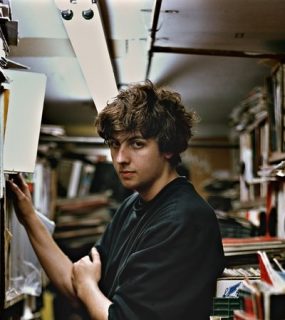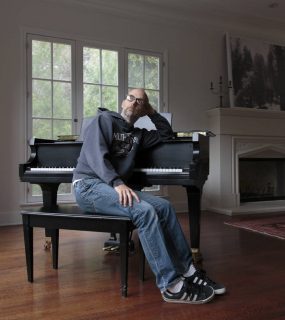Kaytranada – Got It Good (feat. Craig David)
Whilst we know he can spit bars up there amongst the best, it’s R&B-mode where Craig David excels, and as his resurgence continues, as does his tie-up with some of the brightest new talent out there and you probably couldn’t get brighter than Kaytranada.
Dropping his wonderful new album 99.9% earlier today, one of the most-anticipated cuts came by way of the Craig-featuring Got It Good, and as end-results go, it seems both make one heck of a team. Fingers crossed Kay makes an appearance on the Southampton lad’s new album.
Read the rest of this article at Stagedoor
CHARLOTTE DAY WILSON – Work
On her second solo single, “Work,” Toronto’s Charlotte Day Wilson offers gospel-tinged R&B that speaks to a life fueled by the hustle. Formerly known for her time with R&B quintet the Wayo, Wilson’s low register could at times be mistaken for Rhye’s Milosh, as her spiritual blues become entangled in pop hooks and jazzy percussion. And like Milosh’s own tracks, “Work” has a soulful ambience that is heightened by Wilson’s sighed harmonies and evocative storytelling. Her woozy vocals feel alternately caught up in the rapture or in a melancholy stemmed from personal doubts, but “Work”’s heavenly fragments of quivering guitar, looping drums, and organ create a self-assured mood. For any hustler on the move, “Work” is an ode to honoring commitment, to the beauty of mastering your own destiny. Wilson is evidently doing just that.
Read the rest of this article at Pitchfork
Agar Agar ~ Prettiest Virgin
Latest discovery from Parisian label Cracki Records, Agar Agar made a prominent debut in the French indie scene with their first track “Prettiest Virgin.”
The duo, consisting of singer Clara Cappagli and producer Armand Bultheel, is expected to drop an EP next September.
Clara’s warm and smooth voice is combined with Armand’s layers of cold, gloomy synths for a 6-minute long captivating track. The track has a retro vibe to it, reminiscent of the 80s — with that certain something that won’t leave you indifferent.
Read the rest of this article at indie shuffle
FYFE – Stronger
It’s been a hot minute since I last covered anything by FYFE, so this comes as a welcome return.
I wasn’t actually paying attention when this song came up in my feed, so wasn’t aware who the artist was when it started. That changed real quick, though, as soon as the recognizable vocals kicked in.
“Stronger” marks the first new material since 2015, and will appear on an upcoming EP called Stronger.
Read the rest of this article at indie shuffle
Yuna – Lanes
Malaysian singer-songwriter Yuna’s upcoming album Chapters is quickly approaching. In the past she’s made some candid, vulnerable, minimal indie pop, but she’s leaned more toward traditional R&B and hip-hop on her singles “Crush” and “Places To Go,” recruiting assistance from vets from each respective genre in Usher and DJ Premiere.
Her latest offering is “Lanes,” and it finds her standing on her own two feet, sticking up for herself in the midst of mistreatment from her partner. She sounds wounded and exposed, singing, “If this is love, I don’t want it/ If this is love, you can keep it/ You call this love, and don’t respect it/ If this is love, why am I hurting?” Deep 808s, subtle trap drums, and bursting synth anchor her firm stance before a bright synth pattern lifts the mood and energy for the realization in the hook, “We’re on different lanes/Chasing different things.” Yuna has always had a special gift for translating mood and emotion, but as of late she’s displayed a confidence in her sound that makes her transmissions all the more potent.
Read the rest of this article at StereoGum
News
Jamie xx And The Value Of Other People’s Music

I found Jamie xx in a New York record store by design — both his and mine. The then 26yearold electronic producer born James Smith was in the midst of his first fullfledged solo headlining tour of the U.S., following the release of the hit album In Colour; and since scouring record stores was among his primary downtime activities in each town he visited, the idea was that Jamie would report from a few tourstops to discuss the records he found at, say, Gramophone in Chicago, or at the Underground Resistance store in Detroit.
The activity also dovetailed with the nature of the tour: Jamie was on the road as a DJ. This was partly because In Colour’s clubmusic vibe lent itself to a night of records, not live instruments, and partly because, as he himself said to me, “I already have a band” (referring to The xx, the Mercury Prizewinning, South London indieelectronic trio). There was also the matter that Jamie is a phenomenal DJ, fluently mixing musical styles and eras — by year’s end, this was loudly acknowledged when he was voted onto Resident Advisor’s influential DJ Poll. Still, the notion that a member of a popular group was DJing rather than playing live confused both critics (“Producer w/own music…spins trax by others? Is this what musicians do?” asked Wall Street Journal’s Jim Fusilli in an online debate following Jamie’s Coachella set) and some of his own audience (Caius Pawson, who runs Young Turks, the London label that Jamie and The xx record for, and who supported Jamie on the tour told me, “We were losing about 1520% of the crowd in the first half an hour [of the show]”). Despite the form being well over 40 years old — and the fact of hiphop, a musical culture partially born of playing records, has become a global force long ago — the idea of DJing as an accepted musical expression still seems novel in many circles.
Read the rest of the story at NPR
An Interview with Moby, Pine Tree Preacher

Richard Melville Hall, the prolific singer-songwriter, D.J., photographer, entrepreneur and activist better known as Moby, requires little introduction.
Six years ago, the New York City native moved to Los Angeles and began blogging on the city’s architecture and commenting on its cultural and environmental merits in interviews. Moby’s fondness of his new home base was immediately obvious.
On the eve of a northeaster, while questioning the limits of my own NYC tenure, I reached out to see how his newest endeavor, an organic vegan restaurant calledLittle Pine, fit into his West Coast fairytale.
We spoke at Moby’s evergreen-shrouded home, steps from L.A.’s Griffith Park. In addition to the East/West debate, we talked about veganism as the next gay marriage, the pursuit of passion versus the pursuit of wealth, and using western medicine as a last resort.
Moby carried the conversation. A transcript, edited for length and clarity, follows.
GC: You have been in LA for several years now. What inspired opening a restaurant?
Moby: In New York, I owned couple of restaurants called Teany, the main one on Rivington. I opened it with an ex-girlfriend and I largely did everything wrong. I had no restaurant experience, no business experience, no entrepreneurial experience. And my girlfriend had never worked in a restaurant and never opened a business, so we had to figure out everything while we were doing it.
We broke up the day it opened. And somehow, it worked.
Meaning, it barely broke even and was time consuming and stressful. But when you walk into a space that you’ve created and curated and it’s full of people who are enjoying themselves, it’s really satisfying, especially, in my case, if it is ostensibly advancing veganism, organic farming, and animal rights. So that’s kind of the reason I wanted to open a restaurant here– to serve my community, and to provide a non-didactic example of veganism.
Read the rest of the story at Garden Collage
Radiohead’s New Album Makes a Heartbreaking Case for Unplugging

It starts with a fade to white. As you may have heard elsewhere on the internet, Radiohead heralded their ninth studio LP A Moon Shaped Pool with a characteristic bit of techno-trickery: they deleted every tweet they’d ever made, deactivated their Facebook account, and slowly dimmed their website to printer-paper white.
There was silence. It was a gesture many of us could identify with. When the chaos of modern life creeps in, it’s easy to engage in this sort of digital annihilation—to rip your ethernet cable out of the wall, wipe the slate clean, and stew for a bit, unburdened by the weight of having to live a second life online.
This felt different from the way the band had dealt with tech to date. Since the turn of the millennium, Radiohead have been early adopters of pretty much every new technology the music internet has had on offer. Kid A was released with an ahead-of-its-time foray into the world of pre-release album streams. In Rainbows anticipated the proliferation of pay-what-you-want downloads (and was, for that matter, an early instance of a group of major artists selling directly to fans). Thom Yorke released a solo album through BitTorrent, and would eventually decry Spotify as “the last desperate fart of a dying corpse.” In his eyes, streaming companies were just another instance of industry “gatekeepers” and Radiohead had already figured out how to cut out the middle man and navigate the Wild West of the post-Napster net all by themselves.
Read the rest of the story at thump


